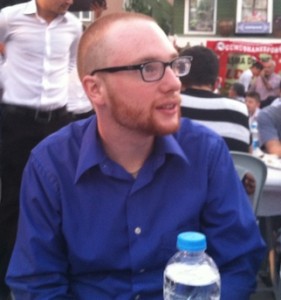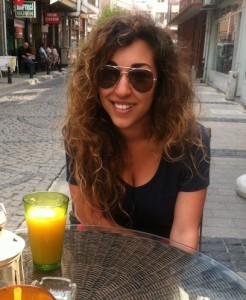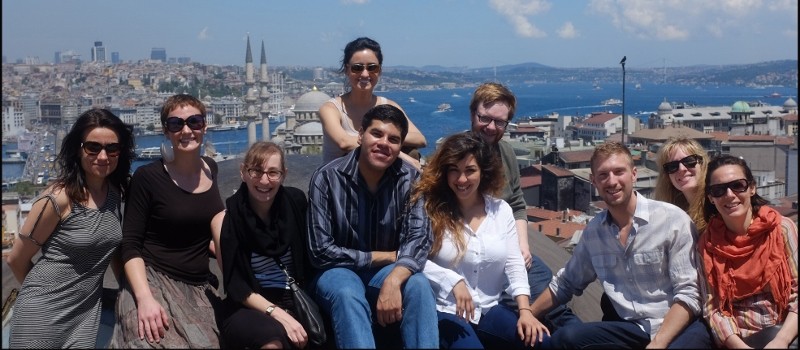

During the IFP Jill Boyd and Joel Arken interned together at Mazlumder, a Muslim human rights NGO. At Mazlumder they conducted research and drafted reports on the Gezi Park protests and the Syrian Refugee crises as they were occurring. The reports discuss the media portrayal of these two events by the Turkish media. The reports can be viewed on Mazlumder’s website: Gezi Park Protest, Syrian Refugees In Turkey.
[feather_share skin=”wheel” size=”24″]
What made you decide to pursue your graduate studies in the GPIA program at The New School?
Joel: When I finished my undergraduate degree at The New School, I wanted immediately to continue my education, feeling that I wasn’t done learning. While the global studies program at Eugene Lang provided introductions to several theoretical traditions, GPIA offered practice-based learning that I didn’t see offered elsewhere. The International Field Program, specifically, drew me to GPIA. Also, I took a class on Transitional Justice and Human Rights with Louis Bickford before I enrolled in GPIA. I loved the class and was impressed by the students. I am in the Governance and Rights concentration. Most of the classes I am interested in relate to human rights traditions and how states manage their power.
Jill: I was living in California when Occupy Wall Street captured the world’s attention. I was captivated by the movement and booked a trip to check it out. I had been done with my undergrad for almost five years and visited The New School while in the city. I planned on applying to the Graduate Program in International Affairs upon my return home because I knew this was the place to be if I was going to be trained to ask critical and forward-thinking questions that I knew were in me and being stirred by Occupy’s influence. At this point, The New School and Occupy Wall Street became an inseparable fascination their lure was completely intertwined as far as I could tell.
What initially attracted you to want to work with Mazlumder?
Jill: Mazlumder intrigued me because their orientation and worldview was completely unknown to me. It was portrayed as one of the most challenging sites because it is religiously conservative, making its appeal even stronger. Even though Turkey is a secular country with a Muslim majority population, Mazlumder is an Islamist organization with fascinating political ties. Although it may appear intimidating or challenging on paper, the experience gained both professionally and personally was unprecedented. The opportunity to work with the organization resulted in a new personal research lightning rod that tends to focus on topics of non-Western approaches to International Relations, refugees, and Political Islam.

You had the experience of working and living in Istanbul during the Gezi Park protests. Describe the atmosphere in Istanbul during the protests and your perception of the protestors?
Joel: The environment in Istanbul was tense, but varied completely depending on the part of town. The business areas away from the city center seemed very calm to us, as well as the art districts on the Asian side of the city. Taksim during the protest was sort of like a politicized music festival, but when the police were near, the people mobilized in solidarity. The edges of the protest zone where police patrolled were the only forbidden parts of town, the police were intimidating and always present. Individually, the police were uninteresting, but in groups patrolling in minibuses, the atmosphere could change to a threatening hyper-masculinity.
Joel: The protesters had many different thoughts about what needed to be protested (shades of Occupy) and had very personal experiences that made them willing to have tear gas thrown at them, like the couple protesting on their lunch break because they had friends injured by police. I enjoyed talking with the Marxists in Istanbul, especially, because I found their political stances the easiest to understand.
What were your primary sources of information for the reports that you wrote about the protests?
Joel: We used historical documents and news coverage of Turkey as our primary sources. We also conducted interviews with protesters in the park when reporting on the human rights abuses. Most of our individual research involved the protests, so many interviews with Mazlumder and other organizations also discussed the protests. My roommates in Turkey were very connected to the ongoing protests and we shared articles throughout our stay. The IFP group was very collaborative and supported each other’s research.
What are the major human rights challenges in Turkey?
Joel: Freedoms of the press and assembly are obvious challenges. Criticizing the government is stringently censored in most media. Turkish prisons have reportedly gotten safer, but are often unregulated. Violence against women is a running problem in Turkey, as well.
What was enlightening about working with Mazlumder.
Joel: Seeing how [Mazlumder] used [Islam] to promote human rights was fascinating. [Their] work challenged my preexisting notions of how human rights are universally applied and the context of human rights violations. I also learned about Turkish work culture, which was a refreshing break from New York.
How did your perspective of Mazlumder change from the beginning of the internship to the end.
Jill: Before we arrived in Istanbul, Mazlumder was perceived as somewhat of a wild card organization. I think this was because no one knew quite what to expect. For me, interning with Mazlumder was an exceptional experience, but I was also shockingly not shocked. That is to say that the transition to their work environment was smoother than anticipated.
Jill: For me, rather than being critical of their worldview or operations, I tried to absorb their approach so I can learn from it. I think this was where my interest in non-Western approaches started to manifest without my noticing. It was an opportunity to learn how others view and interact with the world. Looking back, one of the most important things I learned from Mazlumder’s approach was the reintroduction of three major concepts previously taken for granted as universal: justice, freedom and democracy.
Jill: Lastly, because Mazlumder is a religious organization, it was extraordinary to experience their community programs during Ramazan. We had the opportunity to break the month’s daily fasting with Iftar dinners in the company of our coworkers and community members several times. This added a different dimension to my experience with Mazlumder. Instead of just contributing files, words and research, we were able to have very personal experiences with them as well.
What was a major challenge for you during the IFP?
Jill: Of all things, I was most nervous about my research topic. I desperately wanted it to be relevant and transferable to understanding the dynamics of the Muslim world, especially as it pertains to the Middle East, North Africa, and Central Asia. In fact, I changed my topic three topics while I was there. All things considered, I would say that the paper I produced in Istanbul is my favorite of all other writings from grad school so far. The paper explored Syrian refugees in Turkey through the lens of its fascinating foreign policy doctrine. Not only was it relevant, it was exciting because I was able to tandem my personal research with that of Mazlumder’s and likewise gained access to some incredible interviews. Since then, professors like Peter Hoffman and Lily Ling have helped me build on this aspect of research that intrigues me by exploring other refugee issues, such as Palestinians in Lebanon, or learning how to think dialectically about Political Islam.
What is one success and one failure you experienced during the IFP?
Jill: [A success was] holding a rough, elementary conversation with a cab driver on my own. Remaining unharmed when visiting the protests. Finally tapping into the rhythm of Istanbul and learning to navigate the lay of the land. It’s the little things. I will add though, that returning from Istanbul also revealed a new confidence. It was easily recognized within me as well as every other student who was on the Istanbul IFP. Although unseen, you can’t help but return noticeably different. For a lot of us, it resembled something like blooming.
Jill: [One failure was] taking off my neck scarf at a Mazlumder hosted picnic during Ramazan in the middle of summer, revealing the long tank top dress I was wearing. I was immediately reprimanded by a fellow employee that I needed to cover up and put the scarf back over my shoulders. I felt like this quick slip overshadowed any attempts I made all summer to be modest. Lesson learned.
What are some memorable experiences you had with people you met there?
Joel: [I made] friends with a local hairdresser who liked my hair; he became one of my closest friends while in Turkey. He and his friends were hilarious and thought I was entertaining even though we could speak only a little to each other. We bonded over the protest and the rapper Macklemore. A second experience was when Jill and I were invited to go to a Ramazan celebration with people we met through Mazlumder. We met journalists and people from Turkey who cooked traditional dishes from all over the nation. We felt like guests of honor even though one of the Vice Presidents was also in attendance
How has working with Mazlumder influenced you?
Jill: Academically and professionally speaking, [working in Turkey] pushed me into the next realm. Given that I was impacted by such a positive experience with Mazlumder, I was curious if Muslim organizations existed in the city and immediately began my research. This past fall I began an internship with the American Society for Muslim Advancement. Their programs range from engaging in peaceful and holistic dialogue between the West and Muslim-majority countries, developing an American-Muslim identity in a post-9/11 context, and projects that promote women’s rights grounded in Islamic principles rather than a Western human-rights based approach. Working with ASMA has been an incredible experience to carry on what was sparked in Istanbul. I extended my position with them into the spring simply because being there has been so challenging, rewarding, interesting, and connected to my overall research interests.
What is the future for human rights in Turkey?
Joel: It is hard to say what the future is for human rights in Turkey. I am hopeful that there are many sincere politicians that feel it is their mandate to govern to ensure human rights, but the protest highlighted systemic problems with Turkish power structures that have not changed. The many NGOs dealing with human rights in Turkey work tirelessly to achieve their missions. I saw evidence of this at Mazlumder and it gave me hope for Turkey.
What advice would you give to future IFP Turkey students?
Joel: Read all you can about Turkey and be active in the Turkish language course. When in Turkey, be adventurous and talk to strangers. Listen for political nuances in conversations.



